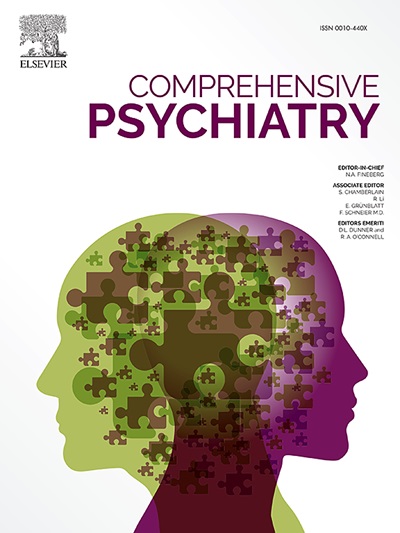An exploratory analysis of obsessive-compulsive personality traits, pathologic anger and quality of life among trauma-exposed veterans
IF 4.2
2区 医学
Q1 PSYCHIATRY
引用次数: 0
Abstract
Introduction
Trauma exposure and post-traumatic stress disorder (PTSD) are associated with high rates of co-occurring personality pathology, including Obsessive Compulsive Personality Disorder (OCPD). OCPD is characterized by rigidity and perfectionism, leading to internalized distress, interpersonal difficulties, and lower quality of life (QOL). Individuals with OCPD often report high levels of anger, which may exacerbate distress and interpersonal issues. However, the relationship between OCPD, anger, and QOL in trauma-exposed Veterans remains understudied.
Materials and methods
92 Veterans with warzone trauma, hyperarousal symptoms, and moderate to severe problems with anger were recruited from a VA Medical Center for a study on cognitive-behavioral therapy for anger. Assessments included standardized interviews on demographics and trauma history, as well as self-reports on OCPD and borderline personality disorder (BPD) traits, anger, and QOL.
Results
OCPD scores were significantly correlated with higher state anger (r = 0.276, p = 0.013), trait anger (r = 0.275, p = 0.016), and lower social QOL (r = −0.344, p = 0.002). BPD scores were similarly associated with higher state (r = 0.242, p = 0.031) and trait anger (r = 0.291, p = 0.011), but had lower QOL in all domains.
Conclusion
In this exploratory analysis, OCPD traits in trauma-exposed Veterans were linked to higher anger and lower social QOL, with effect sizes comparable to BPD traits. This highlights the importance of screening for OCPD traits to inform treatment strategies and improve outcomes, especially given that OCPD traits receive less clinical attention than BPD traits.
创伤暴露退伍军人强迫症人格特征、病理性愤怒与生活质量的探索性分析
创伤暴露和创伤后应激障碍(PTSD)与同时发生的人格病理(包括强迫性人格障碍(OCPD))的高发率相关。OCPD以僵化和完美主义为特征,导致内化痛苦、人际关系困难和较低的生活质量。患有OCPD的人通常会表现出高度的愤怒,这可能会加剧痛苦和人际关系问题。然而,创伤暴露退伍军人的OCPD、愤怒和生活质量之间的关系仍未得到充分研究。材料和方法从退伍军人医疗中心招募了92名有战区创伤、亢奋症状和中重度愤怒问题的退伍军人,进行愤怒的认知行为疗法研究。评估包括对人口统计学和创伤史的标准化访谈,以及OCPD和边缘型人格障碍(BPD)特征、愤怒和生活质量的自我报告。结果socpd得分与较高的状态性愤怒(r = 0.276, p = 0.013)、特质性愤怒(r = 0.275, p = 0.016)、较低的社会生活质量(r = - 0.344, p = 0.002)显著相关。BPD得分与较高的状态(r = 0.242, p = 0.031)和特质性愤怒(r = 0.291, p = 0.011)有相似的相关性,但在所有领域的生活质量都较低。结论创伤暴露退伍军人的OCPD特征与较高的愤怒和较低的社会生活质量相关,其效应量与BPD特征相当。这突出了筛查OCPD特征对制定治疗策略和改善结果的重要性,特别是考虑到OCPD特征比BPD特征得到的临床关注更少。
本文章由计算机程序翻译,如有差异,请以英文原文为准。
求助全文
约1分钟内获得全文
求助全文
来源期刊

Comprehensive psychiatry
医学-精神病学
CiteScore
12.50
自引率
1.40%
发文量
64
审稿时长
29 days
期刊介绍:
"Comprehensive Psychiatry" is an open access, peer-reviewed journal dedicated to the field of psychiatry and mental health. Its primary mission is to share the latest advancements in knowledge to enhance patient care and deepen the understanding of mental illnesses. The journal is supported by a diverse team of international editors and peer reviewers, ensuring the publication of high-quality research with a strong focus on clinical relevance and the implications for psychopathology.
"Comprehensive Psychiatry" encourages authors to present their research in an accessible manner, facilitating engagement with clinicians, policymakers, and the broader public. By embracing an open access policy, the journal aims to maximize the global impact of its content, making it readily available to a wide audience and fostering scientific collaboration and public awareness beyond the traditional academic community. This approach is designed to promote a more inclusive and informed dialogue on mental health, contributing to the overall progress in the field.
 求助内容:
求助内容: 应助结果提醒方式:
应助结果提醒方式:


